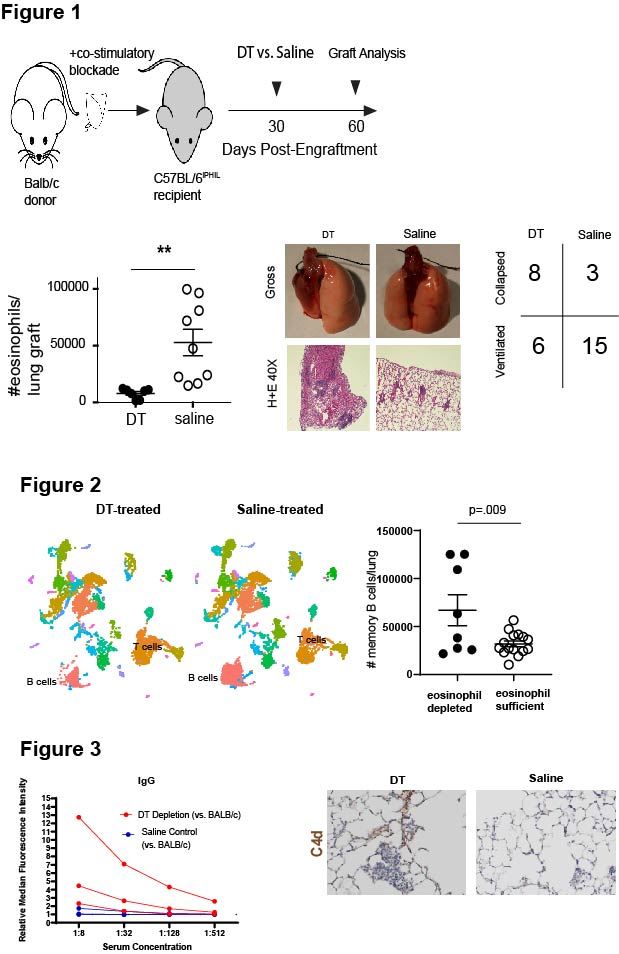Lung Allograft-Resident Eosinophils Maintain Long-Term Graft Integrity by Restraining Humoral Alloimmunity
1Department of Surgery, University of Maryland, Baltimore, Baltimore, MD, 2Washington University in St. Louis, St. Louis, MO, 3Department of Surgery, University of Maryland, Baltimore, baltimore, MD
Meeting: 2022 American Transplant Congress
Abstract number: 195
Keywords: Alloantibodies, B cells, Eosinophils, Lung transplantation
Topic: Basic Science » Basic Science » 04 - B-cell / Antibody /Autoimmunity
Session Information
Session Time: 8:10am-9:15am
 Presentation Time: 8:30am-8:45am
Presentation Time: 8:30am-8:45am
Location: Hynes Veterans Auditorium
*Purpose: The finding that eosinophils facilitate immunosuppression-mediated acceptance of murine lung allograft by downregulating alloreactive CD8+ T cells has been recently described by our group. However the role of eosinophils in the maintenance of established tolerance is unknown.
*Methods: To study the role of eosinophils in the maintenance of established tolerance we engrafted fully MHC-mismatched BALB/c (H2d) lung allografts to iPHIL mice on a C57BL/6 background (H2b), where the diphtheria toxin receptor is expressed on the eosinophil peroxidase-specific promotor. Long-term tolerance was induced by co-stimulatory blockade of the CD40-CD40L and CD28-CD80/86 pathways. For some animals delayed eosinophil depletion was accomplished through the administration of diphtheria toxin (DT). Some control mice were treated with saline vehicle only. Allografts were analyzed by flow cytometry, histology, and immunohistochemistry 8 weeks after engraftment (4 week period of engraftment + 4 weeks of eosinophil depletion/or not).
*Results: Both gross and histologic analysis demonstrated a higher number of collapsed allografts after delayed eosinophil depletion (p=.02)(Figure 1). However histologic and flow cytometric analysis did not reveal an increase in the traditional ISHLT grade of rejection or a significant change in the number and/or activation of graft-resident T cells. Single cell RNA sequencing demonstrated both quantitative and qualitative differences in the B cell population with a flow cytometric increase in the relative number of memory B cells in DT-treated/eosinophil-depleted mice (Figure 2). Serum analysis demonstrated an increase in anti-Balb/c IgG in DT-treated/eosinophil-depleted mice. Immunohistochemistry revealed deposition of C4d in eosinophil-depleted lungs supporting the concept of antibody-mediated rejection (Figure 3).
*Conclusions: We now demonstrate for the first time that eosinophils play a key role in the maintenance of tolerance by restraining B cell activation. Taken together with our previous findings this data suggests a central and highly critical role for eosinophils in both the establishment and maintenance of lung allograft homeostasis and integrity.
To cite this abstract in AMA style:
Mei Z, Guo Y, Li D, Khalil M, Banerjee A, Gelman A, Kreisel D, Krupnick A. Lung Allograft-Resident Eosinophils Maintain Long-Term Graft Integrity by Restraining Humoral Alloimmunity [abstract]. Am J Transplant. 2022; 22 (suppl 3). https://atcmeetingabstracts.com/abstract/lung-allograft-resident-eosinophils-maintain-long-term-graft-integrity-by-restraining-humoral-alloimmunity/. Accessed February 17, 2026.« Back to 2022 American Transplant Congress

